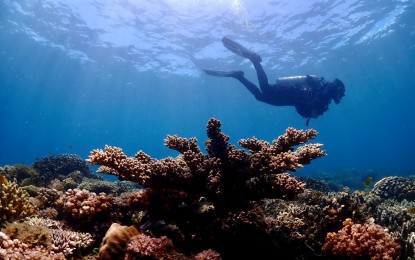
CORAL REEFS. A diver swims past a coral reef off the coast of Escaño Beach in Barangay Piapi, Dumaguete City in an undated photo. On Monday (Sept. 21, 2021), more or less 40 professional divers conducted an underwater assessment of the coral reef and marine life in the area amid the controversial 174-hectare proposed reclamation project in the Negros Oriental capital. (Photo courtesy of Glenn Carballo)
DUMAGUETE CITY – Professional divers and resort owners in Negros Oriental are apprehensive over the possible negative impacts of the proposed 174-hectare offshore reclamation project in this capital city on the diving and tourism industry.
Glenn Carballo, owner of Azure Dive Resort and president of the Negros Oriental Dive Association (NODA), told the Philippine News Agency in an interview that they decided to conduct an initial dive on Tuesday to determine the current state of the corals and sea grass beds in the area.
Carballo said more or less 40 divers joined the dive Tuesday morning near the “Dagsaan” area at Escaño Beach in Barangay Piapi here to also show their solidarity to the “No to 174 Reclamation” movement which has been calling for the scrapping of the project for more than two months now.
NODA, comprising some 30 resorts and dive shops in Negros Oriental, and owned by some of the “most experienced people in the diving industry in the Visayas”, noted that Dumaguete is the gateway to some of the most famous dive spots in the province and in the world, including the renowned Apo Island in Dauin town.
Earlier, Carballo wrote Mayor Felipe Antonio Remollo inviting him or the city’s representatives to join NODA in the dive, and to participate as well in a number of programs on understanding marine life and how people here benefit from it.
“As an organization, we are deeply concerned about the grave impact of the proposed 174-hectare Smart City reclamation to the future of the diving industry,” Carballo said in his letter to the mayor.
The “ambitious project” will affect the coral reefs not just in Dumaguete but also in Bacong, Dauin, and Zamboanguita, he noted.
Neither Remollo nor any of his representatives were present in the dive, Carballo said.
The NODA president told Remollo in his letter that they will submit to his office “a thorough and latest assessment” of the city’s marine environment, hopefully “to enlighten him”.
Remollo has repeatedly said in his statements that the reclamation project will benefit the people here through the generation of jobs, livelihood opportunities, and the boost in the economy, among others.
He said the project will be built “at no cost to the city” and is still in the early stages, with no permit application submitted yet to the Philippine Reclamation Authority or the Department of Environment and Natural Resources.
The mayor had also commissioned a group from outside of Dumaguete to conduct an underwater/marine survey, although the results have not yet been divulged to the public.
However, a coalition opposition group of environmentalists, scientists, church officials, and people’s organizations, among others, has noted alleged legal irregularities in the process by which the PHP23-billion unsolicited project is being pushed.
They also cited moral and environmental reasons in opposing the project, which was proposed by E.M. Cuerpo, Inc., a Quezon City-based group which has ties with a Chinese firm, Poly Changda Engineering Co., Ltd. (PNA)
